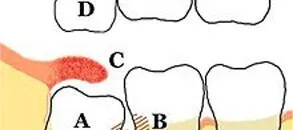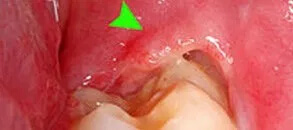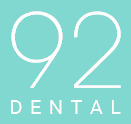What is Wisdom Tooth Removal?
Typically wisdom teeth (3rd molars) erupt into the mouth at between 17 and 25 years of age. Not all people get all four wisdom teeth, and some do not get any. As wisdom teeth are the last teeth to come through, it is common for there to not be enough space in one’s mouth to accommodate them. They therefore often get caught (become impacted) either by the tooth in front (second molar) or by the jaw bone behind. The deeper wisdom teeth are impacted, the less likely they are to give trouble. When they are only partially impacted in the mouth they can be very problematic and should then be extracted.
If the impacted wisdom tooth is causing chronic discomfort or decay of the adjacent tooth, then the removal of this offending tooth should permanently relieve such pain.

DIAGRAM OF PERICORONITIS AND DECAY

PERICORONITIS AROUND A WISDOM TOOTH
Who should have their Wisdom Teeth removed?
Partially impacted wisdom teeth can cause two problems that may necessitate their removal. These are:
Pericoronitis – this is infection of the soft tissue/gum around the tooth. This is because debris collects in the area. The most obvious symptoms of pericoronitis are:
- Pain which centres around the offending tooth, but can be felt as far back as the ear
- Swollen gum around the tooth which can catch when you are biting down
- A bad taste that seems to flow out of the painful area
In some cases sufferers of Pericoronitis can have a high temperature, headaches and lethargy. Stress such as exam time is a common trigger for Pericoronitis as one’s immune system is compromised. A short-term solution is to have the area syringed with Chlorhexidine (Corsodyl) by the dentist and a course of antibiotics. If this is a recurring problem then getting the wisdom tooth removed is the best solution.
Decay (Caries) – of the adjacent tooth and the wisdom tooth because food and drink debris gets stuck between the two teeth. Treating the decay of the adjacent tooth can be near impossible with a filling unless the wisdom tooth is removed first. Symptoms of tooth decay include intermittent toothache and increased tooth sensitivity.
What does having a tooth extracted involve?
We at 92 Dental have a dentists with special interests in Oral Surgery and in Maxillo-Facial Surgery who carries out the removal of problematic wisdom teeth, problematic roots, as well as any other necessary surgical procedures.
Once a patient has an initial consultation with our oral surgeon, and it has been determined that extracting a tooth is the best course of action, we can extract the tooth in only one visit.
We usually use local anaesthetic when extracting teeth at 92 Dental. This use of local anaesthetic will completely numb the area of the face where the tooth is being removed, meaning that no pain will be felt during the procedure. However for nervous patients, and others who may desire it, we can offer sedation by request.
Once the extraction is complete you will likely experience pain and swelling. This can be managed at home with painkillers, antibiotics and ice. We will offer you any support necessary while you recover from the extraction.
